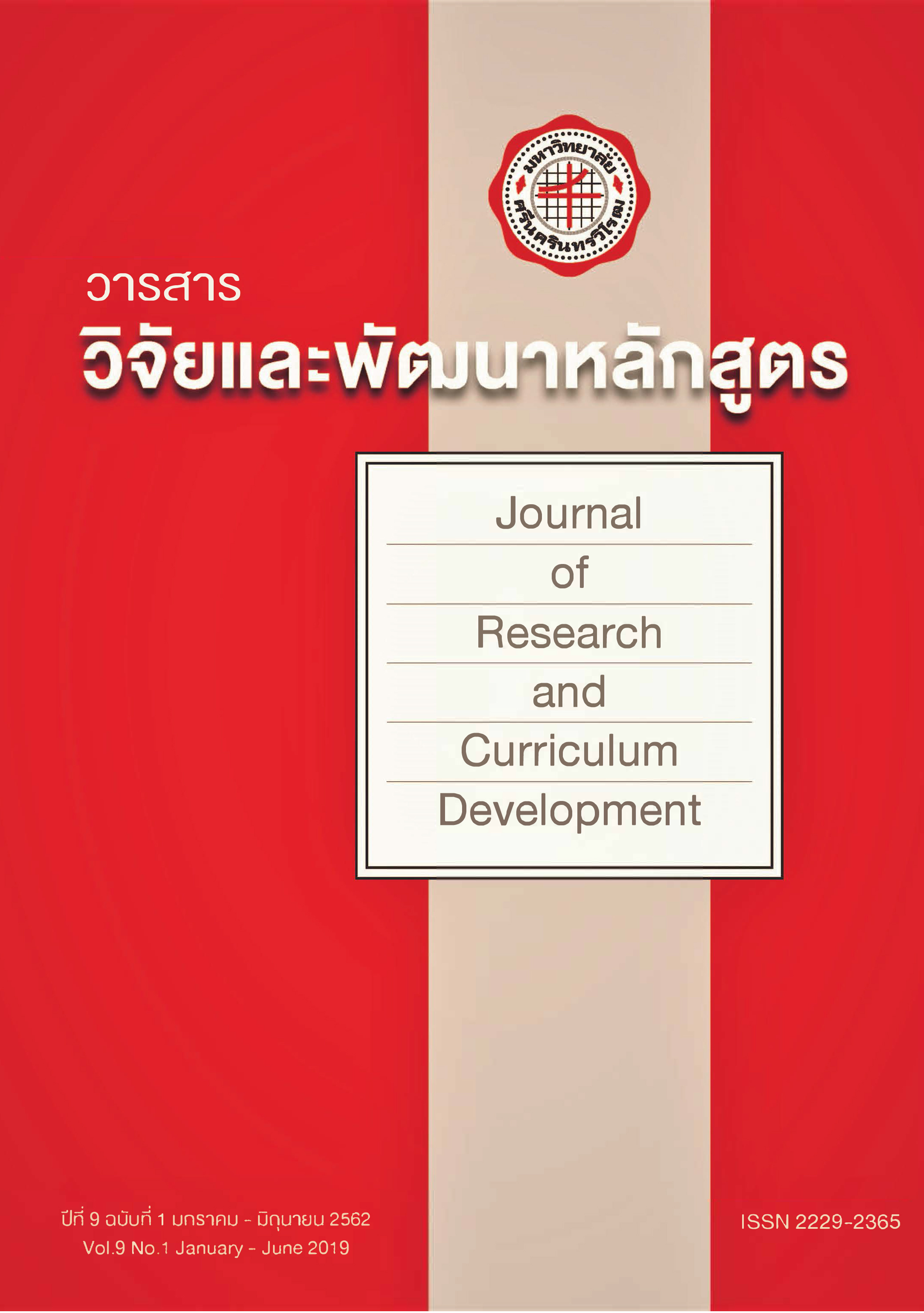การพัฒนาระบบคอมพิวเตอร์แนะแนวการศึกษาและอาชีพ สำหรับนักเรียนระดับมัธยมศึกษาตอนต้น
Keywords:
Computer Guidance System, Lower Secondary School Students, Education and Career GuidanceAbstract
The purpose of this study were to: 1) develop eeducational and career guidance computer systems for lower secondary school students; and 2) evaluate eeducational and career guidance computer systems for lower secondary school students. The researcher developed and validated the quality of assessment tool which based on Holland's vocational personality theory to be used as a computer guidance system which was measure of interest, perceived ability, and personality for education and career planning of lower secondary school students. The system was evaluated by experts and users in two groups; guidance teachers or teachers who provide counseling on education and career to lower secondary school students, and lower secondary school students. Descriptive statistical analysis was employed as follows; average, and standard deviation. The results of system development showed that the system had two core functions, receiving the answer from the paper-based testing and on-screen-based testing. The system could process the score and showed the report immediately containing information for lower secondary schools students for continuing education (high school and vocational education) and career planning. The results of system evaluation showed that the system was able to work well and was evaluated in all aspects from all evaluator groups at a much to most level ( = 4.20 to 4.90, S.D. = 0.31 to 0.71).
References
สืบค้น 25 เมษายน 2558, จาก https://lmi.doe.go.th/images/file/research/research42.pdf
กระทรวงศึกษาธิการ. (2551(. หลักสูตรแกนกลางการศึกษาขั้นพื้นฐาน พุทธศักราช 2551. สืบค้น 20 กรกฎาคม 2561,
จาก https://academic.obec.go.th/newsdetail.php?id=75
ชูศรี สุวรรณ. (2541(. การทดสอบทางจิตวิทยา. เชียงราย: ภาควิชาจิตวิทยาและการแนะแนวคณะครุศาสตร์ สถาบันราชภัฏเชียงราย.
สานักงานคณะกรรมการกฤษฎีกา. (2542(. พระราชบัญญัติการศึกษาแห่งชาติ พ.ศ. 2542. สืบค้น 1 ธันวาคม 2557, จาก
https://www.moe.go.th/edtechfund/fund/images/stories/laws/prb_study(final).pdf
สานักงานคณะกรรมการการศึกษาขั้นพื้นฐาน. (2555(. แนวการจัดกิจกรรมแนะแนวตามหลักสูตรแกนกลางการศึกษาขั้นพื้นฐาน
พุทธศักราช 2551. กรุงเทพฯ: โรงพิมพ์ชุมนุมสหกรณ์การเกษตรแห่งประเทศไทย.
สุทธิกานต์ บ่อจักรพันธ์. (2557(. เอกสารประกอบการสอนการเขียนโปรแกรมคอมพิวเตอร์. อุดรธานี:
คณะวิทยาศาสตร์ มหาวิทยาลัยราชภัฏอุดรธานี.
Allen, J., & Robbins, S. (2010). Effects of interest-major congruence, motivation, and academic performance on timely
degree attainment. Journal of Counseling Psychology, 57, 23-35. doi: 10.1037/a0017267.
Bardick, A., Bernes, K., Magnusson, K., & Witko, K. (2006). Junior high students’ career plans for the future: A Canadian
perspective. Journal of Career Development, 32(3), 250-271. doi: 10.1177/0894845305279168.
Carless, S. (1999) Career assessment: Holland’s vocational interests, personality characteristics, and abilities. Journal
of Career Assessment, 7(2), 125-144.
Holland, J. (1985). Making Vocational Choices: A Theory of Vocational Personalities & Work Environments (2nd ed.).
NY: Prentice Hall.
Holland, J. (1996). Exploring careers with a typology: What we have learned and some new directions. American
Psychologist, 51(4), 397-406.
Kanfer, R., Wolf, M., Kantrowitz, T., & Ackerman, P. (2010). Ability and trait complex predictors of academic and job
performance: A person–situation approach. International Association of Applied Psychology, 59, 40-69.
doi:10.1111/j.1464-0597.2009.00415.x
Kim, T., & Kim, Y. (2001). The effect of a computer-assisted career guidance program on secondary schools in Korea.
Asia Pacific Education Review, 2(1), 111-118.
Laak, J., Gokhale, M. & Desai, D. (2013). Understanding psychological assessment: a primer on the global assessment
of the client's behavior in educational and organizational setting. CA: SAGE.
Lai, W., & Tsen, H. (2013). Exploring the relationship between system development life cycle and knowledge
accumulation in Taiwan’s IT industry. Expert Systems, 30(2), 173-182. doi: 10.1111/j.1468-0394.2012.00630.x
Nauta, M. (2010(. The development, evolution, and status of Holland’s theory of vocational personalities: Reflections
and future directions for counseling psychology. Journal of Counseling Psychology, 57(1(, 11-22.
doi: 10.1037/a0018213
Skorikov, V. (2007). Continuity in adolescent career preparation and its effects on adjustment. Journal of Vocational
Behavior, 70, 8-24. doi:10.1016/j.jvb.2006.04.007
Sung, Y., Cheng, Y., & Wu, J. (2016). Constructing a situation-based career interest assessment for junior high school
students and examining their interest structure. Journal of Career Assessment, 24(2), 347-365.
doi: 10.1177/1069072715580419
Thompson. N. (2014). Financial Advantages of Computer Based Testing. Retrieved July 2, 2018, from
https://www.assess.com/docs/Financial-Adavantages-computerized-testing.pdf
Witko, K., Bernes, K., Magnusson, K., & Bardick, A. (2006). Senior high students’ career plans for the future: Outcomes
of the comprehensive career needs survey in Southern Alberta, Canada. International Journal for Educational and
Vocational Guidance, 6, 77-94. doi: 10.1007/s10775-006-9103-3





